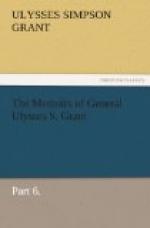Soon after I left President Lincoln I received a dispatch from General Weitzel which notified me that he had taken possession of Richmond at about 8.15 o’clock in the morning of that day, the 3d, and that he had found the city on fire in two places. The city was in the most utter confusion. The authorities had taken the precaution to empty all the liquor into the gutter, and to throw out the provisions which the Confederate government had left, for the people to gather up. The city had been deserted by the authorities, civil and military, without any notice whatever that they were about to leave. In fact, up to the very hour of the evacuation the people had been led to believe that Lee had gained an important victory somewhere around Petersburg.
Weitzel’s command found evidence of great demoralization in Lee’s army, there being still a great many men and even officers in the town. The city was on fire. Our troops were directed to extinguish the flames, which they finally succeeded in doing. The fire had been started by some one connected with the retreating army. All authorities deny that it was authorized, and I presume it was the work of excited men who were leaving what they regarded as their capital and may have felt that it was better to destroy it than have it fall into the hands of their enemy. Be that as it may, the National troops found the city in flames, and used every effort to extinguish them.
The troops that had formed Lee’s right, a great many of them, were cut off from getting back into Petersburg, and were pursued by our cavalry so hotly and closely that they threw away caissons, ammunition, clothing, and almost everything to lighten their loads, and pushed along up the Appomattox River until finally they took water and crossed over.
I left Mr. Lincoln and started, as I have already said, to join the command, which halted at Sutherland Station, about nine miles out. We had still time to march as much farther, and time was an object; but the roads were bad and the trains belonging to the advance corps had blocked up the road so that it was impossible to get on. Then, again, our cavalry had struck some of the enemy and were pursuing them; and the orders were that the roads should be given up to the cavalry whenever they appeared. This caused further delay.
General Wright, who was in command of one of the corps which were left back, thought to gain time by letting his men go into bivouac and trying to get up some rations for them, and clearing out the road, so that when they did start they would be uninterrupted. Humphreys, who was far ahead, was also out of rations. They did not succeed in getting them up through the night; but the Army of the Potomac, officers and men, were so elated by the reflection that at last they were following up a victory to its end, that they preferred marching without rations to running a possible risk of letting the enemy elude them. So the march was resumed at three o’clock in the morning.




